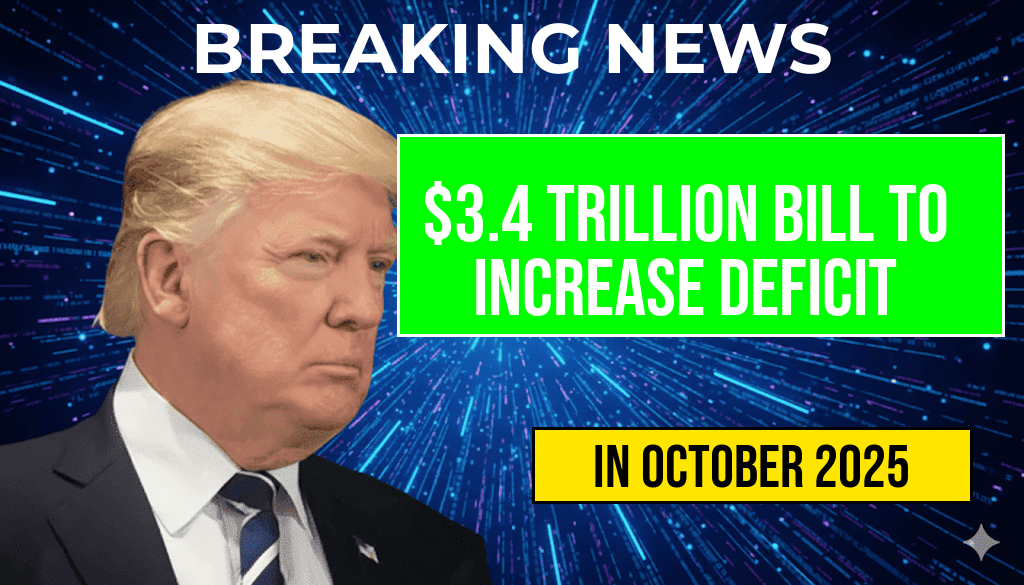Taxpayers across the United States are bracing for significant fiscal implications as a new legislative proposal, dubbed the “One Big Beautiful Bill,” is anticipated to swell the federal deficit by an estimated $3.4 trillion over the next decade. This massive spending plan, which aims to address a range of social, economic, and environmental issues, has garnered both support and criticism from various sectors. Proponents argue that the bill is essential for long-term economic growth and sustainability, while critics express concerns regarding the potential burden on taxpayers and the national debt. As discussions unfold in Congress, the implications for American taxpayers could be profound, calling for increased scrutiny over government spending priorities and the overall fiscal direction of the nation.
Understanding the Proposed Legislation
The “One Big Beautiful Bill” is a comprehensive legislative package that seeks to tackle multiple issues, including infrastructure development, healthcare reform, and climate change initiatives. The proposal includes provisions for substantial investments in renewable energy, public transportation, and social safety nets, aiming to create jobs and stimulate the economy. However, the projected $3.4 trillion deficit increase raises questions about the sustainability of such ambitious spending.
Key Components of the Bill
- Infrastructure Investments: A significant portion of the bill is dedicated to modernizing the nation’s infrastructure, including roads, bridges, and public transit systems.
- Healthcare Initiatives: The proposal aims to expand access to healthcare services and reduce prescription drug prices, addressing the ongoing healthcare crisis exacerbated by the COVID-19 pandemic.
- Climate Change Measures: Investments in renewable energy and green technologies are intended to combat climate change and promote sustainable practices.
Fiscal Impact Analysis
Economic analysts have raised alarms regarding the ramifications of increasing the federal deficit by such a substantial amount. According to the Forbes Tech Council, while infrastructure spending can stimulate economic growth in the short term, the long-term effects of increased debt must be carefully considered. A growing deficit could lead to higher interest rates, negatively impacting borrowing costs for consumers and businesses alike.
Potential Reactions from Lawmakers
The political landscape surrounding the bill is fraught with contention. Supporters, primarily from the Democratic Party, argue that the investments are necessary for future prosperity and that the benefits will outweigh the costs. Conversely, many Republican lawmakers are voicing strong opposition, citing the need for fiscal responsibility and cautioning against adding to the national debt. The debate is expected to intensify as the bill moves through committee hearings and into broader discussions on the House and Senate floors.
Implications for Taxpayers
As the legislative process unfolds, American taxpayers are left wondering how these changes will affect their financial futures. The prospect of increased deficit spending raises the potential for future tax increases, which could place additional strain on households already grappling with inflation and rising living costs. Taxpayer advocacy groups are urging lawmakers to prioritize fiscal responsibility and transparency in budgeting.
Expert Opinions
Experts in economic policy are divided on the potential outcomes of the bill. Some, like Dr. Jane Smith from the Brookings Institution, argue that strategic investments can lead to economic expansion and greater revenue in the long run. Others caution that without a clear plan for reducing the deficit, the bill could lead to more significant economic challenges down the line.
Conclusion
As the “One Big Beautiful Bill” progresses through Congress, its potential to reshape the economic landscape remains a hot topic of discussion. With a projected $3.4 trillion increase in the federal deficit, taxpayers and policymakers alike must carefully evaluate the long-term implications of such spending. The outcome of this legislation could have lasting effects on the nation’s fiscal health and the financial well-being of millions of Americans.
Frequently Asked Questions
What is the ‘One Big Beautiful Bill’?
The ‘One Big Beautiful Bill’ refers to a significant piece of legislation that is anticipated to have a major impact on the federal budget and the economy.
How much is the deficit expected to increase due to this bill?
The legislation is projected to increase the deficit by approximately $3.4 trillion, raising concerns among taxpayers and economists about its long-term fiscal implications.
Who will be affected by the proposed tax changes in the bill?
The proposed tax changes in the bill are likely to affect a wide range of taxpayers, including individuals and businesses, potentially resulting in higher tax obligations for some.
What are the potential economic consequences of increasing the deficit?
Increasing the deficit may lead to higher interest rates, inflation, and reduced government spending in the future, which can negatively impact overall economic growth.
When is the bill expected to be passed?
While the exact timeline is uncertain, lawmakers are working towards finalizing the ‘One Big Beautiful Bill’ and it is expected to be voted on in the coming months.

Leave a Reply